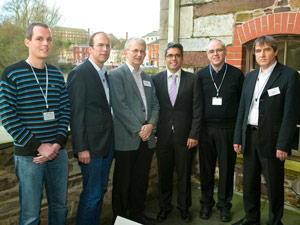- News
10 April 2014
Tyndall to lead EU project to design next-generation devices
Tyndall National Institute in Cork, Ireland is leading a European research project to develop a test environment to help create the electronic and photonic devices of the future.
Led by professor Eoin P. O’Reilly, head of the Theory, Modelling and Design Centre at Tyndall, the project DEEPEN (from atom-to-Device Explicit simulation Environment for Photonic and Electronic Nanostructures) will involve Tyndall-based researchers working in close partnership with research teams from across Europe, including ETH Zurich (Switzerland), Osram Opto Semiconductors GmbH (Regensburg, Germany), Paul-Drude-Institut für Festkörperelektronik (PDI, Berlin, Germany), technology computer-aided design (TCAD) software provider Synopsys (Zurich, Switzerland) and University of Rome ‘Tor Vergata’ spin-off Tiberlab S.r.l. (Rome, Italy). The project will use its members’ combined expertise in device design and nanomaterials to help revolutionize the design and implementation of future electronic and photonic devices.
 Picture:
The DEEPEN project team (left to right): professor Mathieu Luisier (ETH Zurich), Dr Lutz Geelhaar (Paul Drude Institute Berlin), professor Eoin O'Reilly (Tyndall), Dr Alvaro Gomez-Iglesias (Osram Opto Semiconductors), Dr Fabio Sacconi (TiberLab) and Dr Axel Erlebach (Synopsys).
Picture:
The DEEPEN project team (left to right): professor Mathieu Luisier (ETH Zurich), Dr Lutz Geelhaar (Paul Drude Institute Berlin), professor Eoin O'Reilly (Tyndall), Dr Alvaro Gomez-Iglesias (Osram Opto Semiconductors), Dr Fabio Sacconi (TiberLab) and Dr Axel Erlebach (Synopsys).
Specifically, DEEPEN will develop an integrated open-source multiscale simulation environment, targeted at problems common to future nanoscale electronic and photonic devices. New device simulators require an atomic-scale description of selected critical regions of a transistor or LED to capture details that are otherwise inaccessible. They must also resolve the considerable uncertainty in many critical parameters required for device optimization. DEEPEN is addressing both these issues, coherently combining state-of-the-art existing methods and developing new methodologies, integrated within a multiscale framework spanning from first-principles to macroscopic models.
DEEPEN brings together groups with expertise not just in simulation, but also in its application to device design and optimization. It builds on Tyndall and ETH Zurich’s expertise in material and device properties, with experimental input from PDI also critical for validation of the multiscale models to be developed. Of the industry partners, tiberlab will implement the multiscale software framework, Synopsys will provide technology computer-aided design (TCAD) simulation software, and industrial end-user Osram Opto Semiconductors will provide experimental validation and test the simulation environment for device design and investigation. Future code distribution will be supported through TiberLAB’s existing support environment at www.tibercad.org.
The nanoscale models to be developed will address the challenging problem not just of predicting quantitatively the electronic bands and quantum phenomena at the nanoscale but also of linking these critical properties to overall device behaviour. The project emphasizes aggressive dissemination of results to maximize impact, including the organization of Training Schools and an International Workshop, as well as the release and support of demonstration software and the open-source interfaces. Overall, the project aims to strengthen European competitiveness, with clear routes to exploitation of the technology.
Funded by a €2.69m contribution under the European Union’s Seventh Framework Program (EU FP7, subprogram NMP.2013.1.4-1), the three-year €3.82m project (from January 2014 to end-2016) is being formally launched in Athens, Greece at the Industrial Technologies 2014 conference (9-11 April), which integrates nanotechnology, biotechnology, advanced materials and new production technologies, and offers opportunities for developing research and industry collaborations by showcasing research, innovations and rising companies from around Europe.
DEEPEN is a direct response to industry’s need to track and analyse performance at the atomic scale of a design process. To address this issue, researchers aim to develop an efficient and robust framework that allows different computer codes to be merged. Using this open-source framework, the integrated simulation tools will enable developers to track a device’s overall performance changes at a particularly detailed and precise level during testing.
“The DEEPEN project gives us an opportunity to work with leading academic and industry partners in this challenging but highly rewarding area,” said O’Reilly at the conference. “Our work will have a direct impact on future device design and optimization. In addition, our development of open-source codes will help to open up this field to the wider research community”.
DEEPEN is part of a cluster of five projects funded under FP7 that are being launched at the Multiscale Modelling workshop in Athens. The cluster is intended to enable knowledge exchange, in order to foster adoption of novel approaches for multi-scale modelling.
http://cordis.europa.eu/projects/rcn/110555_en.html
www.tyndall.ie/content/theory-modelling-design


